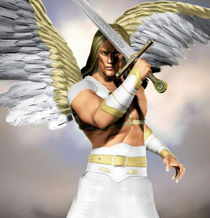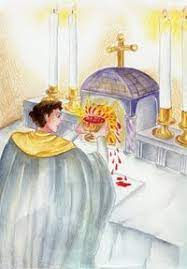The Guardian Angel: Eucharistic Miracle of Ofida, Italy, 1273-1280
- Donald Hartley

- Oct 25, 2021
- 5 min read

Eucharistic Miracle of Ofida, Italy, 1273-1280 In Offida, near the Church of St. Augustine, are kept the relics of the Eucharistic miracle which took place in 1273, in which the Host became living Flesh. There are many documents which describe this miracle, among which is an authentic copy on a parchment of the 13th century, written by the notary Giovanni Battista Doria in 1788. There are also many official decrees of the popes beginning with that of Boniface VIII (1295), to that of Sixtus V (1585), discourses of Roman congregations, Episcopal decrees, communal statutes, votive gifts, memorial stones, frescoes and testimonies of notable historic figures, among whom we recall the Antinori’s and Fella.
In 1273 in the town of Lanciano, a woman named Richiarella went to a witch and asked her how she could recover the affection of her husband, Giacomo Stasio. Following the witch’s advice, she went to Communion to obtain a consecrated Host.

Richiarella returned home and put the Host on the fire in an earthenware jar with the intention of turning the Blessed Sacrament into powder to put into her husband’s food. The Particles, however, were transformed into living Flesh.
Richiarella, horrified by these events, wrapped the jar and the Bloodied Host in a linen handkerchief that she then buried under the manure in her husband’s stable.
Strange events began to take place inside the stable: every time Giacomo’s donkey entered, it would genuflect toward the place where the miraculous Host was buried, and Giacomo began to think that his wife had put a spell on the beast.
Seven years later, Richiarella remorsefully confessed her terrible sacrilege to the prior of the Augustinian priory in Lanciano, Giacomo Diotallevi, a native of Offida.
According to the oldest stories, the woman, in tears, began screaming, “I killed God! I killed God!” The priest went to the place, found the bundle with the relics, and gave them to his fellow-citizens.
This story of the donkey is not the first time the Lord used such an animal to make His Point! Remember Balaam's Donkey (Numbers 22:21-39) and St. Anthony's challenge to Bononillo's lack of faith and his mule in the town square?

A cross-shaped reliquary was made to contain the Host. An ancient story recounts that two monks, Brother Michele and a confrere, were invited to Venice. When they arrived, they made the craftsman promise with an oath of loyalty “that he would not reveal to anyone what he was about to see and place inside the cross. Having taken the oath, the craftsman took the pyx containing the miraculous Host, but, struck with a sudden fever, exclaimed, ‘What have you brought me, Oh my Brother?’
The religious then asked him if he was in mortal sin. The craftsman answered, ‘Yes’, made his confession to the same priest and, the fever having left him, he took the pyx without any danger. Without extracting the Host, he fixed both Host and pyx, together with the sacred wood, inside the same cross, with a crystal above it, as you can clearly see.”
The reliquaries of the jar and the Blood-stained linen with the cross containing the miraculous Host are exposed in the Church of St. Augustine in Offida. Richiaretta’s house was transformed into a small chapel. In 1973, the seventh centenary of the miracle was celebrated, and every year on May 3rd, the citizens of Offida celebrate the anniversary of the miracle.
There is a prayer in the Coptic Liturgy that I think perfectly answers the first question we are asking. "What do I believe when I believe in the Real Presence?" The prayer goes as follows, a little long, but worth it:

"I believe and I will confess to my last breath that this is the living bread which Your only-begotten Son, our Lord and God and Savior, Jesus Christ, took from our Lady and the Queen of Mankind, the holy, sinless Virgin Mary, Mother of God. He made it one with His Godhead without confusion or change. He witnessed before Pontius Pilate and was of His own free will condemned in our place to the holy tree. Truly I believe that His Godhead was not separated from His manhood for a moment, not even for the twinkle of an eye. He gave His body for the remission of our sins and for eternal life to those who partake of this body. I believe, I believe, I believe that this is in very truth that body. Amen."
That is your faith and mine.
But why do we believe in terms of the promises He made? What blessings and benefits did He assure those who believe in this Eucharistic Mystery? All the blessings that Christ promised to those who believe in the Holy Eucharist are summed up in His own masterful promise of life. Those who believe will receive life and the life that He promised was zoé – the kind of life that belongs to God, the kind of life that Father, Son and Holy Spirit shared and interchanged from all eternity. Those who believe will receive this life. Those who do not believe will die. What kind of life was Christ talking about? It must have been the supernatural life of grace in our souls, of partaking or participation in His own divine life.

This, in homely language, is what the Savior promised those who believed in His Real Presence. He assured them and, therefore, assures us, that we shall be not only alive, but filled with His life, full to brimming and flowing over with strength and power and wisdom and peace and all manner of holiness. This is what sanctity is all about. It is the muchness of the good things of God. It is the more and more and still more of the life of God in our souls. More still, He promises that, provided that we believe in Him in the Eucharist, He will sustain this life in our souls into eternity. In other words, being alive now we shall never die. And most marvelous, He will even make this life pour from our souls into our bodies risen from the grave on the last day and glorified by the vision of God. No wonder the Eucharist is called panis vitae, the Bread of Life. It is that, and let us remind ourselves, and here is the condition, one condition, that before we eat this bread with our lips, we take it by faith into our hearts. Indeed, unless we first have faith, we shall, as Paul tells us, "eat it to our malediction."
Only believers can benefit from this Bread of Life, only believers can profit from the Blessed Sacrament, and only believers can grow in spirit by partaking of the Eucharist depending always on the measure of their faith. Those who believe deeply in the Real Presence will benefit greatly from the Real Presence; those who believe weakly will also benefit accordingly. The Eucharist is capable of working miracles in our lives. So it can – after all, the Eucharist is Jesus. He worked – change the tense – He works miracles, but as it depended then (remember, Christ could not work miracles in certain places for lack of faith), the same now. It depends on the depth and degree of our faith.
.





















Comments